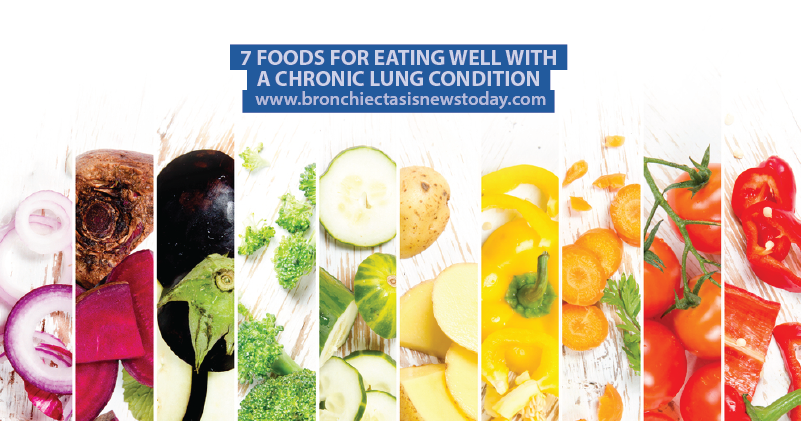Eating a healthy, balanced diet is essential for everyone, but for those living with a chronic lung condition, it is even more important to eat well. The food and drinks we consume can help us achieve better overall health and the nutrients can help protect the lungs against infection.
MORE: Six tips for managing bronchiectasis on a day-to-day basis.
According to the British Lung Foundation, there are certain foods you should be consuming as part of a healthy, balanced diet that can help improve lung health.
Fruits and vegetables
You should aim for at least five different fruits and vegetables each day to aid lung health. Try to eat a variety of colors to ensure you get lots of different vitamins and minerals.
Fiber
In addition to the fiber in the fruits and vegetables you eat, you should also consume some whole grain fiber. Whole grain bread, pasta, and rice are all great sources of fiber and the carbohydrate content will give you energy.
Protein
Protein is essential for keeping muscles strong — including the chest and abdomen muscles needed for breathing. Protein can be found in meat, fish, eggs and dairy products. If you’re a vegetarian or vegan, eat a variety of legumes, nuts, and tofu to ensure you get enough protein.
MORE: What to expect when living with bronchiectasis.
Calcium
Dairy products like milk, cheese and yogurt are an important source of calcium, which is needed if you have to take steroids. Not enough calcium can lead to problems like osteoporosis or brittle bones. Non-dairy forms of calcium include leafy greens, oranges, almonds, and beans.
Oils
Oil used sparingly is very good for you. Choose varieties that are high in vitamins E and A such as olive oil, coconut oil and canola oil.
Water
Water is essential for lung health. Keeping hydrated helps to thin mucus in the lungs and prevent infection. However, some lung conditions may force doctors to restrict the amount of fluid you can drink to prevent water retention, so please ensure you don’t drink more than the recommended amount for your lung condition.
Vitamin D
Many people are deficient in vitamin D and many living with chronic lung diseases have been found to be deficient in the vitamin. It’s thought that vitamin D can help reduce inflammation and boost the immune system. (source: scribd.com) Vitamin D can be found in oily fish, eggs, meat, fortified cereals, milk and orange juice.
MORE: Nine questions to ask the doctor about your bronchiectasis
Bronchiectasis News Today is strictly a news and information website about the disease. It does not provide medical advice, diagnosis or treatment. This content is not intended to be a substitute for professional medical advice, diagnosis, or treatment. Always seek the advice of your physician or other qualified health provider with any questions you may have regarding a medical condition. Never disregard professional medical advice or delay in seeking it because of something you have read on this website.


Some people have bronchiecstatis as well as sarcoidosis (as I do). It is my understanding Vitamin D supplements should not be taken if you have sarcoidosis. Please ask your sarcoidosis consultant or look on line before you take Vitamin D supplements.
What is sarcoidosis? My Pulminologist prescribed calciferol , however I react badly with severe headaches. I take a supplement of Vit D 3 (1000iu)instead x one a day as recommended- is this sufficient?
I have Bronchiectasis as a complication to my Chronic Asthma